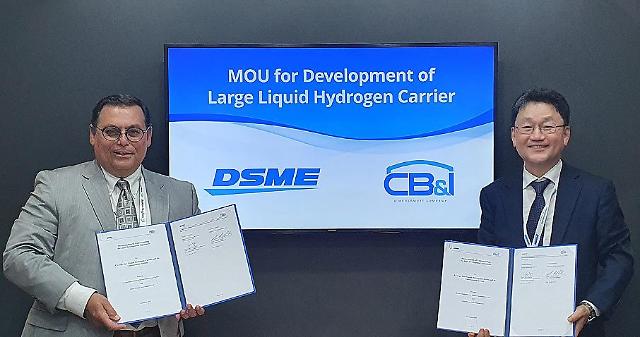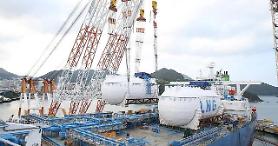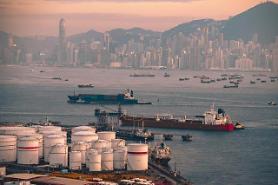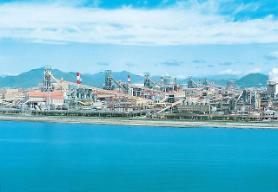
[Courtesy of Daewoo Shipbuilding & Marine Engineering]
Daewoo Shipbuilding & Marine Engineering (DSME) said that the partnership with CB&I would contribute to realizing the large size of liquefied hydrogen carriers. "The combination of our shipbuilding technology and CB&I's storage tank technology will help the domestic shipbuilding industry maintain its world's top position in the field of large liquit hydrogen carriers," an unnamed DSME official said in a statement on October 13.
CB&I has provided NASA's new liquid hydrogen storage sphere that would be the world's largest liquid hydrogen storage unit. The company is also involved in a group led by Shell to develop a liquid hydrogen storage technology for tanks used at import and export terminals.
Hydrogen is extremely flammable when it is mixed with very small amounts of air. The liquefaction of hydrogen requires cooling to a temperature of minus 253 degrees Celsius and subsequent storage in cryogenic containers. The advantage of liquefied hydrogen is its high density compared to compressed gas, which means that more energy can be contained in a given volume for easy transportation.
Liquid hydrogen is essential in a government campaign to expand the use of fuel cells. In January 2022, a prototype won preliminary approval from a domestic maritime classification society, based on design innovation and new cryogenic materials.
Amid growing demands for eco-friendly ships to cope with global economic recovery and environmental regulations, South Korea has accelerated the development of hydrogen-powered ships. A state-initiated project was launched in September 2021 to develop a maritime liquefied hydrogen fuel tank.
POSCO has developed a liquefied natural gas (LNG) storage tank using high manganese steel approved by the International Maritime Organisation (IMO), a U.N. maritime safety agency. The steel group works with the state-run Korea Institute of Machinery and Materials (KIMM), DSME, and Korea Gas Safety Corp. (KGS) to develop a liquid hydrogen storage tank using high manganese steel, which is an alternative material for cryogenic services because it is easier to weld and has lower manufacturing costs than stainless steel.
In April 2021, Hyosung Advanced Materials, affiliated with South Korea's Hyosung Group, secured a six-year contract from Hanwha Solutions to supply high-strength carbon fiber used to reinforce hydrogen fuel tanks.
Copyright ⓒ Aju Press All rights reserved.



